When Justice Anthony Kennedy, the Supreme Court’s crucial swing vote on many matters, announced his plan to retire last month, it was suddenly clear that Roe v. Wade, the decision guaranteeing a woman’s right to abortion, could be substantially eroded or even overturned. News of Kennedy’s retirement caused many women to consider what life without choice might look like and that a post-Roe America might really come to pass. In the days that followed Kennedy’s announcement, the journalist Cindi Leive published an op-ed in the New York Times called “Let’s Talk About My Abortion (and Yours).” In the 1970s and ’80s, she noted, prominent women told the stories of their abortions—on TV and in the pages of People magazine. But in the decades since, the right to choose has become one that most women exercise silently.
The reasons women choose not to talk about their abortions are obvious: It’s a personal decision, made about the interior of our bodies and the consequences of our most intimate acts. And the people who oppose abortion can be vehement and even violent in expressing their objections. But here at Slate, we thought that Cindi Leive had a point: We might better understand what abortion is, and what that right means, if we talked about it more. And so we asked the people who write and podcast for Slate if any of them have abortion stories they’d be comfortable sharing. Six of us do.
The women who will tell their stories below are alike in many ways: We’re all journalists of one stripe or another who’ve ended up in Slate’s orbit and felt able to describe our experiences, which means these stories don’t represent all abortions. But one of Cindi Leive’s points was that women you know have had abortions they don’t talk about. If you read our work or listen to our podcasts, you know us, in a way. Here are the stories we haven’t told you. —Julia Turner
Listen by clicking the arrow on the audio player below, or via Apple Podcasts. The transcript that follows has been lightly edited for legibility.
Rebecca Lavoie: I’m a journalist, a podcaster with Slate and other places, and the author of several true-crime books. I had an abortion when I was 15.
I was in my first sexual relationship with my second boyfriend after my first boyfriend had broken up with me because I didn’t want to have sex with him, which is a really terrible reason, obviously, to start having sex with somebody, but that’s 15. That certainly was 15 for me. I was inexperienced, probably not ready, but I was in this sexual relationship and hiding it from my family. I didn’t have the kind of parents that I could talk to about anything, much less, “Can you take me to the doctor for birth control? I’m sexually active.”
And so, when I was 15, I got pregnant and I hid it. I found out I was pregnant just a couple weeks along, as one does, and I knew that I wanted to have an abortion. I remember my boyfriend and I not really talking about options other than abortion. It was obvious. This is what we both wanted. If it hadn’t been what he wanted, it would have been what I wanted anyway. It felt very much just like a practical, pragmatic choice, both to keep my sex life private from my parents and from the rest of the world and also to not become a parent—to have a sophomore year that was not marked by being the pregnant girl at my high school. It wasn’t even for a minute an option for me to not have an abortion.
Where I grew up, there was a clinic a couple towns over that just through the grapevine my friends told me about. You had to have cash. It was something like $400 in cash. My boyfriend and I at the time, I don’t really remember where we got the money from. But we somehow did. I think we borrowed it from friends. One thing I remember really clearly was the day before I was supposed to go for the abortion. I had been really nauseous for a couple of weeks, and I was in the kitchen of my house and I was about to leave for school and I got sick. I ran over to the kitchen sink and threw up. My mother turned to me and said, “Are you pregnant?” I was just like, “No, no, I’m sick because I’m about to get my period.” And of course, I wasn’t. I was pregnant and I couldn’t talk to her. I just couldn’t. It was not an option. But I knew I had the abortion scheduled for the next day.
I skipped school the next day. I think I faked a note from my parents or something. My boyfriend drove me to the clinic. I had the abortion. I remember him driving me home afterward and getting into bed and just taking a nap. And then I remember when my mom came home from work that night saying to her, “See? I got my period. I told you. That’s why I was sick yesterday.” That was it. It was as simple as that. I could not be a parent at that point, and I certainly could not talk to anybody about any other options. I haven’t really given it a tremendous amount of thought since then.
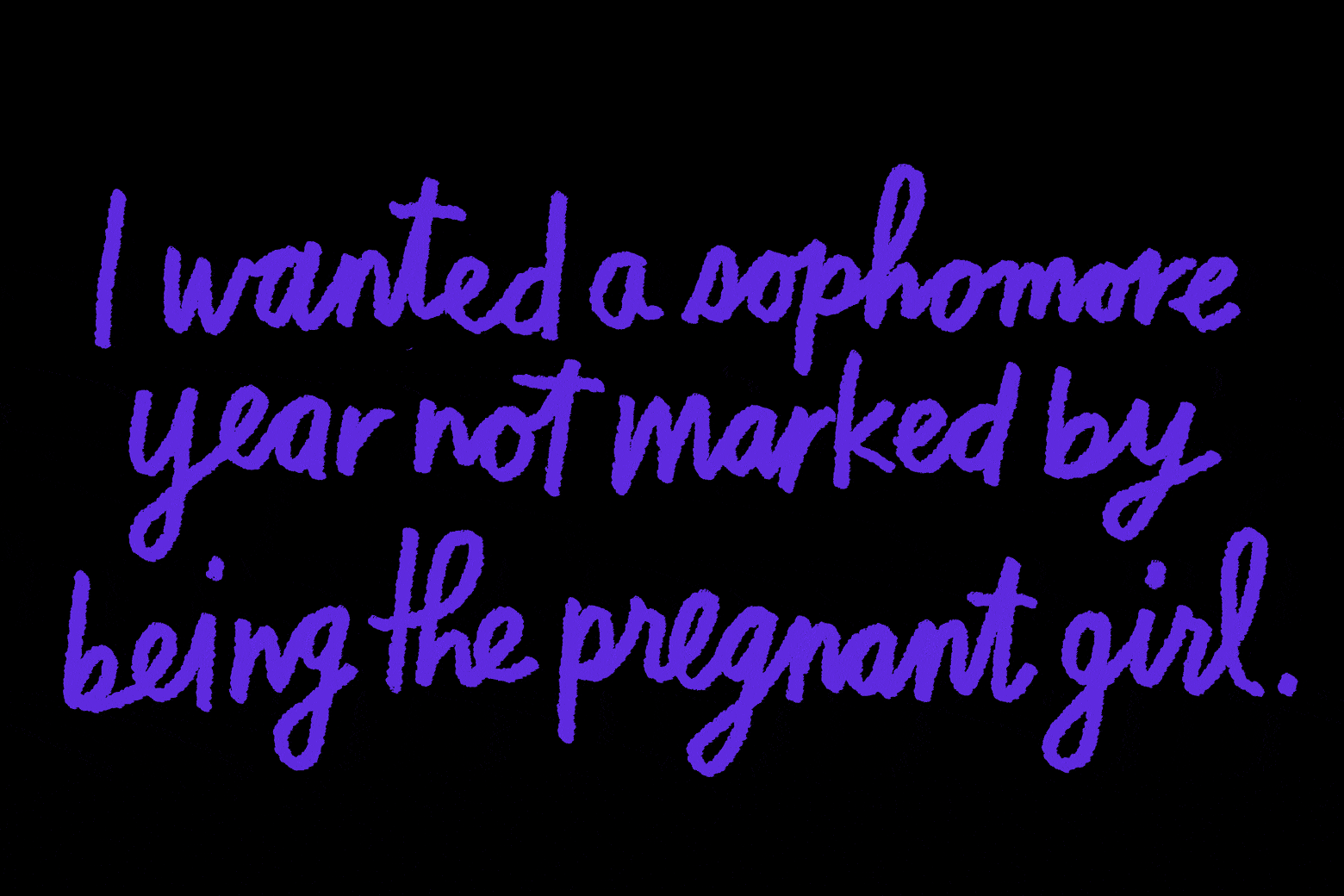
Dana Stevens: I’m the movie critic at Slate and also a co-host of the Slate Culture Gabfest podcast. I had an abortion when I was 24.
OK, this is the most I’ve talked about it in 27 years. So the details may be rusty and may take awhile to come back. But it was in 1991. I was 24 years old and a second-year grad student in a program that I knew was going to take many years to complete. As it turned out, it took me almost a decade to finish that program. I had a boyfriend I was madly in love with, but with whom I had a very tempestuous early-20s kind of relationship. He was quite a bit older, actually—he was in his early 30s. It was one of those relationships where you almost break up every weekend and have dramatic fights.
Looking back, it was probably not a very healthy relationship. It was one that was very important to me at the time. But how I got pregnant was probably a combination of birth control failure and birth control sloppy usage. I was on the pill at the time, and for whatever reason, I just didn’t pay close enough attention to my body that month and found out that I was pregnant. If we’d had a more mature relationship, we probably would have sat down and talked about, “Well, what does this mean for us? Will we have children someday? How do we feel about all of this?” I think a part of me was A) maybe embarrassed that I had let that happen, and B) wanting to continue in the good graces of this eight-years-older boyfriend, a guy in some ways I think I perceived myself as being lucky to be with. That he was sort of too cool for school and I was lucky to be in that relationship in the first place. I didn’t make a big deal out of it on purpose.
I remember my student insurance didn’t cover it at all. I remember an embarrassing visit to the Student Health Center where I was talking to some receptionist and giving her papers and trying to see if the abortion was covered, and she wasn’t understanding what I was asking. It was right in front of this big room full of people waiting to be seen. And then she kept asking, “But what is this?” And then finally, I said in this sort of overly loud voice, “It’s about an abortion.” And then there’s this part of me that felt kind of punk rock about it. Like, “Screw you. I’m not going to feel bad about this.”
I remember a lot of details from the procedure that are sort of poignant now. Although it doesn’t particularly make me sad to remember them, I see that they are kind of sad. For one thing, I didn’t have him come into the room with me to get the procedure. Even though they offered it and he was willing to go in, he wasn’t exactly pressing to go in. I think I just felt somehow that it was something I wanted to tough out alone. Some of that may have been, like I said, a sense of embarrassment or shame. But I think some of it was honestly just wanting to remain hot and cute and appealing to him. It would have been like him coming into a gynecology appointment or something like that. It sort of felt like, well, I don’t want to gross him out with anything too hardcore.
I remember that the aide who came into the room held my hand without asking me, which seemed like a little bit of an importuning gesture. I didn’t ask her to take my hand. But it also seemed sort of weird to snatch my hand away. It did, I guess, feel good to have someone there supporting me. But I couldn’t look at her. Something about looking at a total stranger who’s holding your hand when you’re in this awkward—to say the least—position just felt wrong.
So I remember looking at the wall on the other side, which had a magazine rack on it. And the magazine that was visible in the front of the rack was something about “Why Cher Hasn’t Aged,” which is particularly funny because now it’s 27 years later and she still hasn’t aged. But I just remember thinking of the sad irony of contemplating Cher’s aging process as I was getting my abortion.
It was such a momentous event in my life, not because it was a particularly hard decision to make, but just like, that’s a big moment in your reproductive life, right? You start your period in your teens, and then you maybe have that experience. And then maybe later you have a baby. Then maybe later you go into menopause. Those are the few things that are sort of the flagship events of your reproductive life. In that sense, I think it was important to me. And then it made me realize, Oh, all this stuff is for real. It’s not just lectures about how important birth control is. If I didn’t walk into that clinic on that morning, my life would have been completely different.
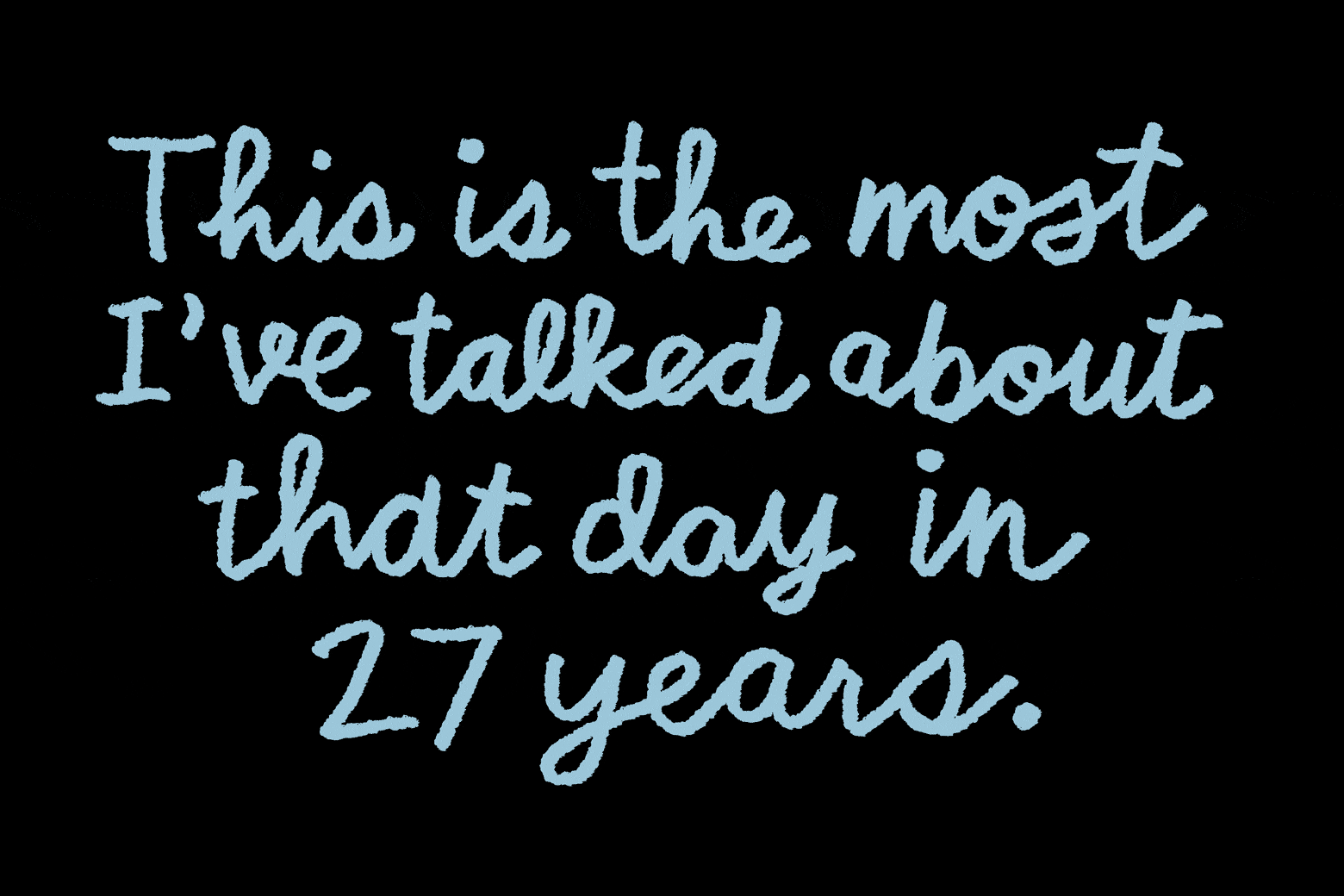
April Glaser: I’m a staff writer at Slate, and I cover the technology industry. I had an abortion scheduled but miscarried before that, when I was either 24 or 25.
It was in Washington, D.C., and I slept with a guy, because that’s how that happens. He was a friend, and we hooked up and used a condom. We were not dating. I had no intention of ever dating him or even sleeping with him again afterward. When I was back in Philadelphia, I had not gotten my period. I went to the store, and you know how you can buy two tests at once just in case? I love the way they sell multipacks. I don’t know if that’s because people have scares regularly or if it’s because after you test positive, you want to test yourself like 50 times. But I bought the double pack and tested positive twice and was terrified. So I made the appointment, and I was feeling pregnant until then. Kind of glowy, kind of bloated, kind of like I am not getting my period like I should be. And I was also feeling just incredibly anxious, because I did not want to deal with this at all. I didn’t have a lot of money. I was at a place in my career where I wasn’t sure if I was going to be a waitress my whole life, or if I was even going to have a career. There was no question that I was going to have to get an abortion no matter what because I didn’t have the money to have a baby.
My abortion was scheduled just a couple weeks after I realized I was pregnant. And a day before I was scheduled to go to the fancy abortion clinic, I had started bleeding that morning around 6 a.m. My few close friends, people I’m super close with, were out of town. I tried to go to walk-in clinics. I went to one and a woman looked at me like I was insane. And she was like, “We don’t do pregnancy here. We definitely don’t give abortions.” I was like, “OK, well, I’m bleeding and this is an emergency and I don’t know what to do.” She was like, “You should go to the emergency room.” I just didn’t want to go to the emergency room because I was afraid of that whole experience, of just it potentially being incredibly expensive, or being kind of shuffled around, or sitting around for hours.
For some reason, I had it in my head that I could deal with it in a walk-in clinic. I don’t know why. And so I went to another clinic, and they also looked at me like I was unwell mentally and were like, “You need to go.” I’m wearing sweatpants and there’s, like, blood spotting on my underwear. I put a pad on and finally I went to Hahnemann Center in Philadelphia. Went in and got triaged and was by myself the whole time. I got brought back and they said that I was miscarrying. I felt relief when I found out I wasn’t pregnant anymore, because that’s exactly what I wanted—to not be pregnant anymore. I was happy that I wasn’t going to have an abortion, but then they told me right away that they would have to do the exact same thing that they would have done if I’d had an abortion, which is to vacuum it out.
And then the man who got me pregnant—I told him maybe about a week after the whole mess with the emergency room happened, and he was just like, “Well, that sounds awful.” I was like, “Yeah, it was awful.” He was like, “How much was it?” And I was like, “I don’t know, just give me 500 bucks.” It wasn’t even half of what it cost for the emergency room, but I didn’t want to deal with it or deal with him or put money on it. I just wanted it all to be over. I told my three friends who had been ready to help. After it was over, I never talked about it.
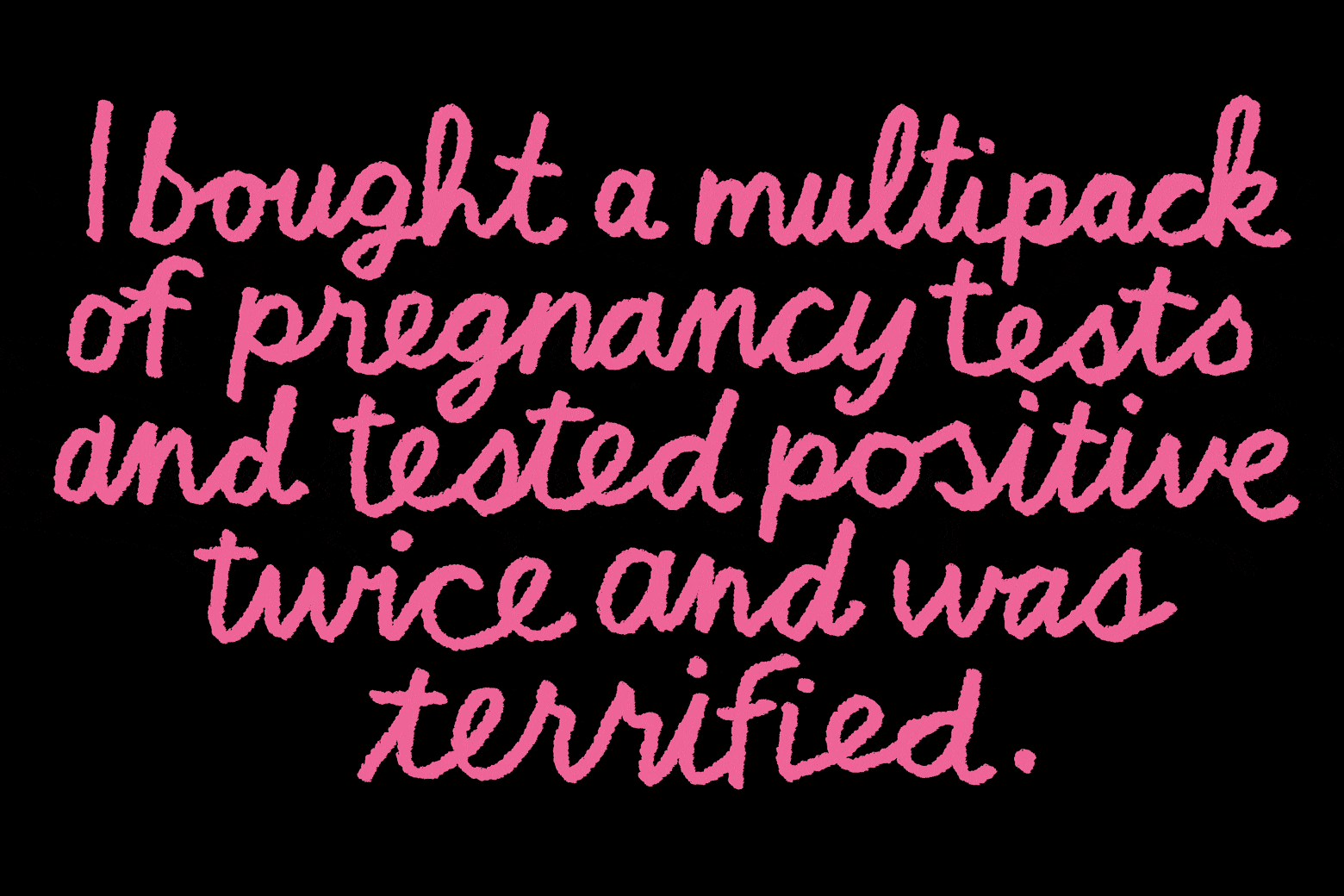
Anna Holmes: I’m the editorial director of the digital magazine Topic.com and a contributor to the Slate podcast the Waves. I had an abortion when I was 18. I had another one when I was about 22, maybe 23, and I had a third when I was 26 or 27.
I got pregnant the summer after my first year of college. I went to NYU. I had a college boyfriend. Maybe this is normal for 18-year-olds who’ve just started having sex regularly, but we had a lot of sex. A lot. He’d actually come out to spend a month with me in California, where I was from. That’s where I was going that summer. That’s where I got pregnant. I knew I was pregnant pretty much immediately, within a couple of days. He had left at this point. I just felt different. So I was totally unsurprised when I did the peeing-on-the-stick thing and found out that I was.
I was upset. I contacted him. He had gone all the way back to Europe, where he was from. That’s where he was going to spend the summer. So he got on a plane and came all the way back to California, which meant a lot that he came back to be with me. There was about, as I said, a week-and-a-half delay between the confirmation of the pregnancy and when the abortion was scheduled. That’s when he came back. But I had to keep this a secret from my mother, whom I was staying with that summer. Which meant that he couldn’t come stay with me because she’d be like, “Why is he coming all the way back from Austria? He was just here.” I’m not going to use his name. Let’s just call him Andrew.
Andrew came back to my hometown and stayed with a friend of mine. The day of the abortion, the three of us drove to the nearest city, which was Sacramento, so I could have the procedure. I just recall riding in my friend’s convertible VW Bug and the top was down. Us in the car with our hair flying everywhere, which felt like a romantic young moment of freedom and abandon, but we’re going to go get one of us an abortion.
What I remember about the abortion is that I waited in the waiting room with my boyfriend and my friend. They called me in. I probably got a gown. They probably did a last exam just to talk to me about what it was going to feel like. I had researched the procedure so that I would know what was going to happen, and I also asked questions before they began the procedure, because maybe that’s how I deal with nervousness. I’m also just genuinely curious about medical stuff. I remember that one of the women in the room—one of the nurses—held my hand. I don’t think I cried. I just think I felt frozen in the moment and stiff and calcified in pain, and then it was over.
After they were done, I was given underwear with a big pad and was brought to a recovery room where there were, I would say, four to five other mostly young women who had also just had abortions. I probably was somber and I was definitely very, very, very relieved. I just recall getting back in the VW Bug with the top down and driving back to my hometown about 15 miles away, with the hair flying everywhere, all of us. My boyfriend had very long hair.
That experience was not traumatic in the sense that I felt alone. Of course, it’s a very alone thing to do. You’re very alone in that moment. But I had people around me. My boyfriend was supportive and was there. There was never a discussion about, “Well, what are you going to do?”
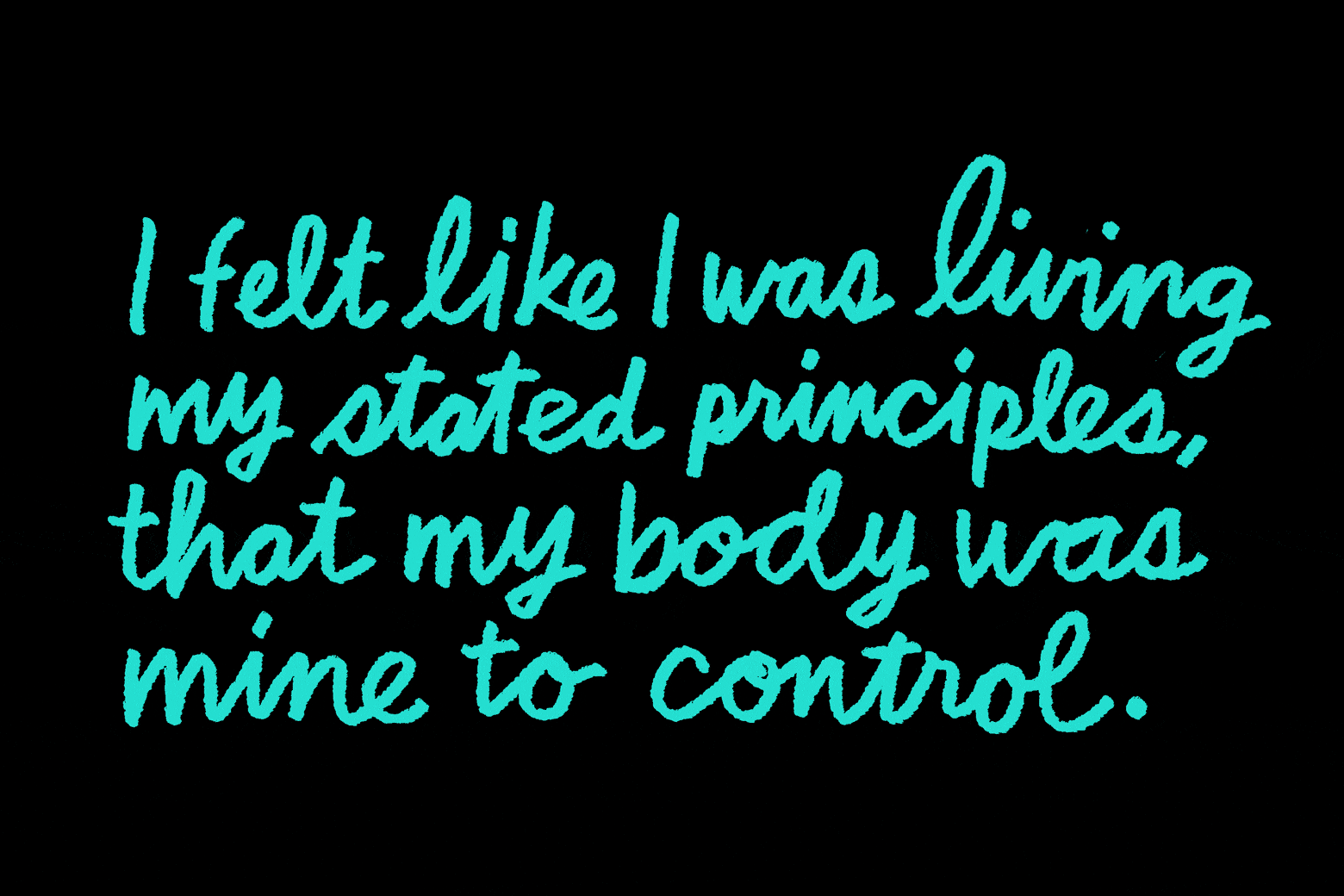
Allison Benedikt: I’m the executive editor of Slate, and I had an abortion when I was 26.
I got pregnant on my honeymoon. I left my birth control pill back in Chicago where I lived, and then we went to get married in California and then went on to our honeymoon in Mexico. I realized immediately that I didn’t have my birth control with me. I actually don’t remember realizing it at my wedding, but I must have. I do remember at the resort in Mexico thinking, “I’m just gonna put this out of my mind because I just want to have a really fun and carefree honeymoon, and nothing’s gonna happen, nothing’s gonna happen.” I have no idea why I thought at age 26, spending a week having a lot of sex, that nothing could happen, and something happened.
I feel like when I got home, I was immediately pregnant. Like I immediately knew. But I’m sure that’s not true. That’s just how I remember it. I remember getting five home pregnancy tests and probably taking them all, crying, feeling in my gut like I knew immediately what I was going to do, but going through the motions of having a conversation about it over a couple of days. My husband, John, really wanted the decision to be mine in a way that I think he was sort of trained to think was the right thing to do and was the right thing to do. But I do remember feeling like I didn’t want the decision to just be mine. That was a lot to carry and figure out. I remember crying, and saying over and over again, I want to have those young, carefree married years. I wanted to have that experience together. I wanted to figure out my career. We decided after a couple of days. But again, I think I knew right away what I was going to do.
I remember calling my gynecologist. I was on a cellphone under the L train in Chicago, my finger to my ear so I could hear her, and trying to make an appointment, which is insane. She told me that I should go to Planned Parenthood. I must have known at the time that you can’t make an appointment with your OB-GYN to have an abortion. But for some reason, I think I thought I was different than all the other girls having abortions, which strikes me as ridiculous now. I remember telling my parents and my sister, and making that a very conscious decision. I thought if we kept it just between me and John, it would be this secret that would cause me to feel shame, and I really didn’t want to feel shame about this. So I thought if I shared it with my family, it would somehow be more open. Talking about it with them made me feel like I was confident in the decision, that I didn’t think anything was wrong with it, because I wouldn’t want to tell them something that would lead them to judge me, so if I told them this, it must mean there was nothing to judge me about.
I don’t remember making the appointment at Planned Parenthood. Maybe John made that appointment. But I do remember parking and walking into this Planned Parenthood clinic and there were protesters out front. It was in the middle of Chicago, so it was not many. But I felt like I was in a movie, like this was some abortion movie and I’m walking past people holding signs and yelling things. I couldn’t believe this was me.
When the procedure is done, you’re in a reclining chair in a sort of waiting room with other women for like an hour, maybe. John went and got the car and I sat in the vestibule and waited for him to pull the car around. On the way home, I felt super nauseous, maybe from whatever they gave me or from the procedure. I’m not sure, but we had to pull over and I threw up out of the side of the car, which also felt very much like I’m in this dramatic movie, like I’m a teen who just had an abortion in a movie, when I wasn’t. I was an adult and I was fine. I rested for a couple of days, and then I later went on to have three children.
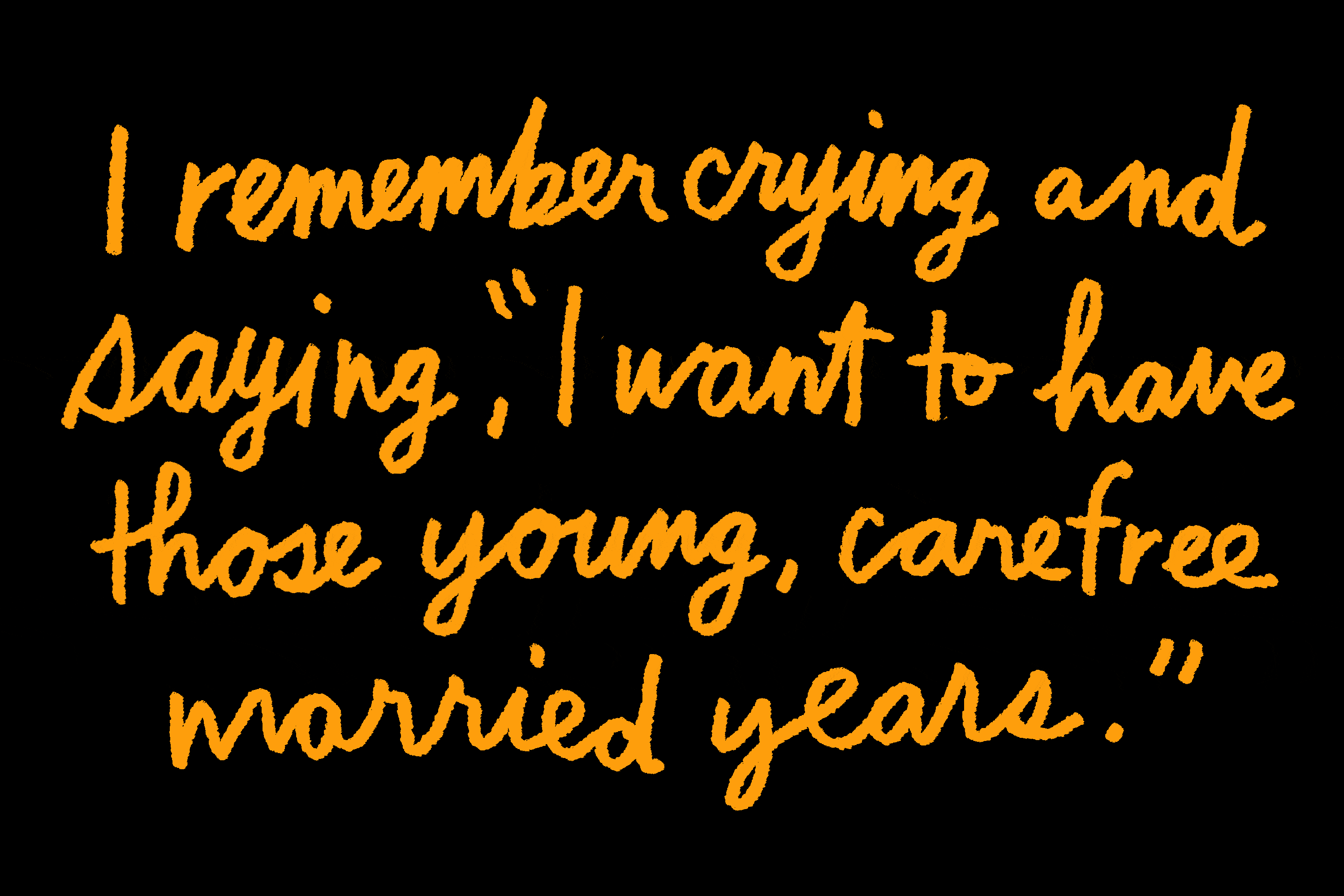
Julia Turner: I’m the editor in chief of Slate, and I had an abortion when I was 34.
When I got pregnant, I was very excited to have children with my husband. We’d been trying, we were ready, we thought. I remember having the thought as we were trying, “I think I’m ready to have a kid. It feels a little soon, but I’m 34. It’s time. I’m just not sure we could handle twins.”
I remember going to the ultrasound technician’s office six or so weeks into the pregnancy. The ultrasound technician looked at the contents of my stomach and said, “It’s a party in there,” and then left the room. I just remember sheer terror at what that meant. And then the doctor came in and said I was pregnant with triplets.
I remember immediately feeling fear and confusion. It was different than the path I thought I was on. I wasn’t sure it was safe. I wasn’t sure I’d be able to withstand it medically and was also just afraid as the hypothetical future parent of three simultaneous children. I changed out of the gown, went into the doctor’s office, and sat there with my husband by my side as she talked through what it meant to be pregnant with triplets.
Amazingly, no one used the word abortion. I think maybe the entire time we were going through the process of learning what the options were in deciding what to do. The term they used was reduction. From the first gynecologist we were with originally to two or three maternal–fetal medicine specialists she then sent us to, everybody used the term triplet reduction and talked about essentially how advisable it was to have one. They certainly gave the impression—some of them through doodling statistics on a notepad, some through telling stories about past anonymized patients—that their medical recommendation was to reduce at least to twins.
It was honestly my first instinct, when I found out, to wonder if that was possible. And then I sort of immediately felt bad for wondering if that was possible. Hearing all of these nice sober people in white coats say, “Yes, yes, of course. Fertility treatments, modern life, multiples, common, blah, blah, blah. This is advised,” I felt slightly absolved of some of the moral weight of the choice because it felt like I was making a proactive choice for the health of the fetuses who would remain, and for my own health. But it was an abortion, and they never used the word.
Once we decided to do it, they did a set of genetic testing on the fetuses to help figure out exactly how it’s safest to proceed, what’s the way to do it that has the best potential health outcome. As it turned out, one of the fetuses had some genetic abnormalities. We received counseling about those results, but it made it clear, sort of, what course the procedure should take. And so we decided to do it. There’s a specialist doctor in Manhattan who is an expert at doing it with good outcomes. We scheduled the appointment. We went to him. I remember it being done with a needle through my stomach. I’m not 100 percent sure I’m remembering correctly. But I think there was an insertion of some kind of chemical into one of the fetuses. And that was the end of it.
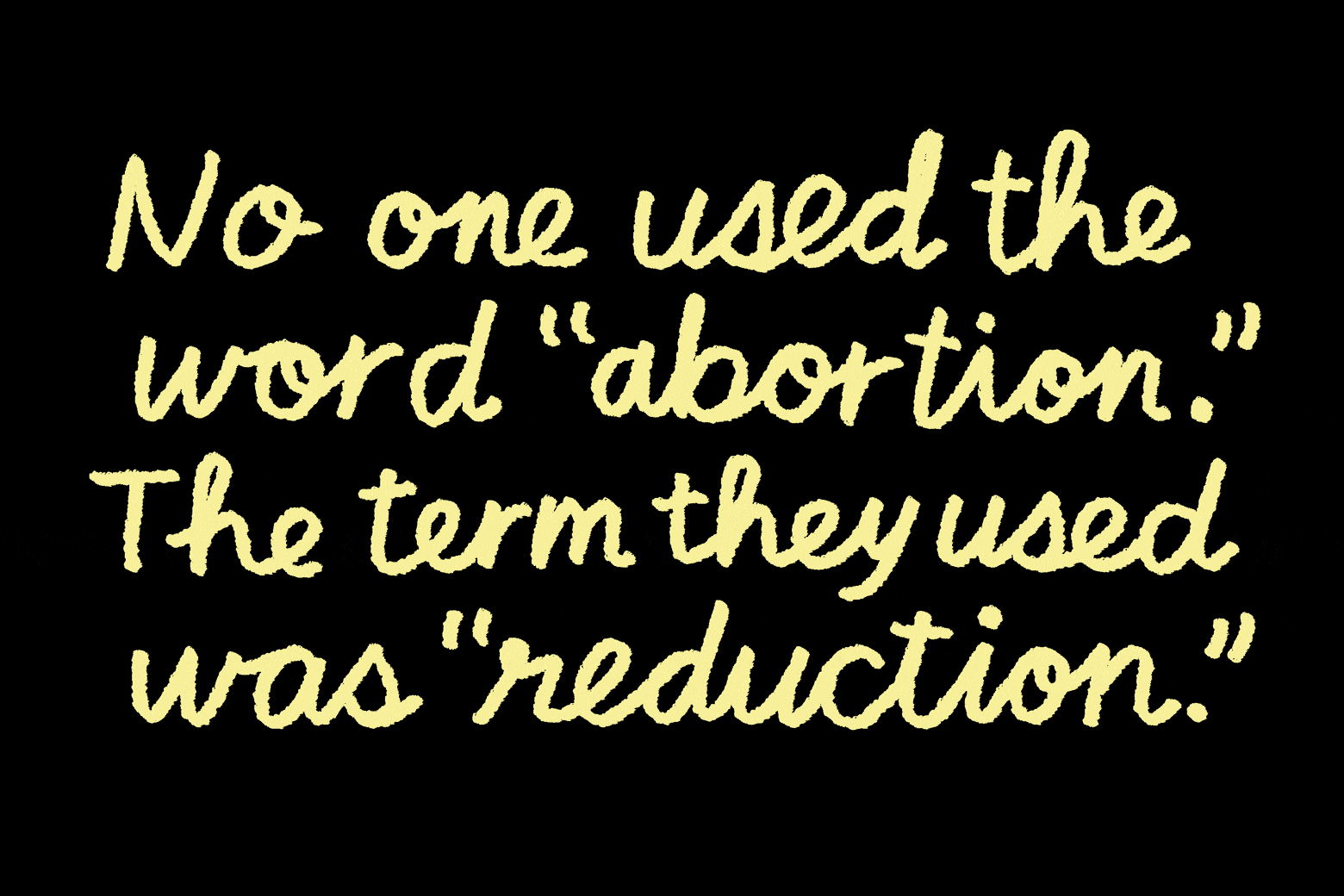
Rebecca Lavoie: I haven’t told my kids about the abortion I had when I was a teenager, but I would, and maybe I will. I don’t know, it’s not something that I’ve really thought about. I think I’d be more likely to tell them if they found themselves in a situation where they had a girlfriend or friend, or if my stepdaughter, for instance, wanted to have an abortion, I would probably share the experience to make them feel less alone, less unique, less ashamed, perhaps.
Anna Holmes: I did feel a certain amount of pride in the fact that I was living my principles. I’d grown up pro-choice, I had gone to pro-choice rallies with my mother when I was a kid in San Francisco. But being pro-choice in theory and being pro-choice in action—I’m not really trying to make a meaningful distinction between those two things. I just felt like I lived my stated principles, that my body was mine to control, that women’s bodies are theirs to control. I never felt guilty about it.
Dana Stevens: I didn’t make a big deal out of it on purpose. I think even looking back on that whole experience now, that—because of my pro-choice beliefs and how strongly I felt about them, in the way that dumb 24-year-olds do—I collapsed that, somehow, with the idea that I had to be very tough and not emotionally vulnerable about this experience. That I somehow would not be strong in my beliefs if I didn’t just power through it and not complain about it or analyze it too much.
Julia Turner: I don’t think about it very often, and the fact that I had a healthy pregnancy and a good set of outcomes after following this medical advice—I’m the type of person who thinks, “Great, I followed the good medical advice and I had a good outcome. Great.” There’s certainly a version of me, or a type of person, who could have that experience and think, “Well, jeez, I was born with a great twin-bearing body. Maybe I could have handled it or I should have done it differently, or this or that or the other.” But no, I don’t revisit it very often.
Allison Benedikt: You can probably hear in my voice that I have some mixed emotions about having had an abortion. I think, at the time, it made perfect sense. I don’t want to use the word regret, because it’s kind of a loaded word in the abortion debate. I’m really glad I had the choice to do this back then, and I have a wonderful life. But I think I feel differently about it when I see what the fetus becomes. I have a bunch of kids. They’re beautiful and awesome, and it’s not nothing to me that I might have had another one. But I think it’s also really OK to look back on the past and question some of your decisions. That’s life. Being honest about those feelings doesn’t change my mind at all about whether or not I think that choice should exist. I absolutely do, and that’s not a position that moves.
April Glaser: I put the abortion behind me so quickly, or I don’t know if it was an abortion—this miscarriage slash abortion, whatever it was. I had just moved on. I never had feelings about it afterward because I didn’t have the privilege, really, to meditate on it. It was just something that had to be done and I did it. And then two days later, it was like, “OK, you took a couple days off. Now you’ve got to show up.” That was that.
Anna Holmes: The second and third abortions I had took place in hospitals in New York City in a surgical room, and I was given anesthesia. So I don’t remember them. I remember feeling sick from anesthesia when I woke up, but I remember nothing about the procedure at all. It was very much invisible. My memory of having an abortion is very much rooted in that first one, where I was wide awake [and] there was not anesthesia. It was also the first time. The other two were relatively easy compared to that first one. Maybe that’s another reason why the first one has made more of an impression.
Julia Turner: One thing my experience makes me think about is the fact that when you follow these debates, you hear about medically necessary abortions or medically indicated abortions to preserve the life and health of the mother and child or whatever the language is in some of those bills and laws. I don’t know if mine would count. Did I have a medically indicated abortion, or did I have an elective abortion? I don’t know. I chose to have a medically recommended abortion. I don’t know what someone in circumstances like mine, how their decision or options would be adjudicated under different legal systems. That’s confusing too. I think the question of what is “medically indicated”—medically necessary, or for the life and health of the mother and the fetuses—is more medically complicated than it necessarily seems when you’re just reading a news story that has that clause in it. Having lived through that particular byway of the medical establishment, I feel very lucky now, and was totally oblivious then.
Dana Stevens: I wouldn’t say that my feelings about abortion, as far as my own experience, have changed. I don’t really have any regrets about that decision, and I can go back and revisit it without a lot of emotion now, with more curiosity about who I was and how I navigated that. I might have navigated it more healthily if it happened to me a few years later in life or with a different partner. I don’t know. But it wasn’t the great trauma of my 20s by any means. That guy provided the great trauma of my 20s, but not in that experience.
Anna Holmes: If I’ve had trouble talking about having an abortion, it’s been in the context of having multiple abortions. Because one is just a mistake. Two is, I don’t know, bad luck and a mistake. And more than that, in my mind—even today to a certain degree, although less so now—is being just purely irresponsible. I’ve had three. I think that’s been the harder thing to talk about: the number of abortions, not the fact that I had one.
Allison Benedikt: I haven’t talked about the abortion much. There have been times when I’ve thought about it, but my husband’s parents are very religious conservatives and pro-life, and we’ve both been wary of being public about this because we don’t want to hurt our relationship with them, and I don’t particularly want to feel judged by them. I know that they would be deeply disappointed to know that we had done this. I also know that they’ll hear this, because they hear everything that I do because they love me and have a Google Alert set up for my name. So I’m a little scared about that, but I also feel like I don’t feel ashamed about it. And so they’ll have to come to terms with their reaction, and I know they’ll love me anyway.
Rebecca Lavoie: I’ve never talked to my mom about having the abortion. I don’t think I ever will, honestly. There are a few topics that I just can’t imagine talking to her about. Because to this day—and our relationship is fine, but she is the kind of person who is very fraught, and really reproach is her default setting when you confide anything personal to her. We have the kind of family where you don’t share information that you don’t want to then hear back a million times in conversation. If she does read this or listen to the podcast, maybe it could spark a conversation, but it’s not one I’m ever going to start.
Julia Turner: I’ve hardly talked about it at all. I’ve probably told my immediate family and a handful of friends. It feels like it’s a medical event that didn’t just happen to me—it also happened to my two children. I went on to have a healthy twin pregnancy and have twins. In some ways, this is something that happened to them too. So it’s not only my story. And telling the story means I’ll tell them someday, which I wasn’t sure whether I would. But it also isn’t something people talk about that much. Even with people they’re really intimate with.
April Glaser: I realized I didn’t mind sharing because it was such … I’d almost forgotten about it. I don’t even want to use the word bury, because that’s as if it’s still under the surface and it’s something that I contend with. Really, it’s something I just don’t even think about anymore. It’s something I did that I have no reservations about having done. I don’t think I mishandled it in any way. I think it’s important to share stories about your experience in case other people could benefit from that shared reality—from knowing that they’re not alone.